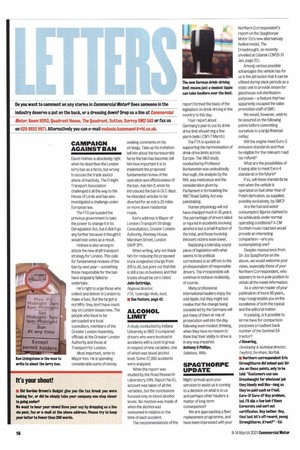ALCOHOL LIMIT
Page 18

If you've noticed an error in this article please click here to report it so we can fix it.
A study conducted by Indiana University in 1962-3 compared drivers who were involved in accidents with a control group in respect of nine variables, one of which was blood alcohol level. Some 27,000 accidents were analysed.
When the report was studied by the Road Research Laboratory (RRL Report No 6), account was taken of all the variables, but the conclusions focused only on blood alcohol levels. No mention was made of when the alcohol was consumed in relation to the time of each accident.
The recommendations of the report formed the basis of the legislation on drink-driving in this country to this day.
Your report about Germany's plan to cut its drinkdrive limit should ring a few alarm bells (CM1-7 March).
The ETA is quoted as supporting the harmonisation of drink-drive limits across Europe. The 1963 study conducted by Professor Borkenstein was undoubtedly thorough, the analysis by the RRL was meticulous and the consideration given by Parliament in formulating the 1967 Road Safety Act was painstaking.
Human physiology will not have changed much in 35 years. The percentage of drivers killed or injured in accidents involving alcohol is but a small fraction of the total, and those involving innocent victims even lower.
Replacing a tolerably sound piece of legislation with what seems to be political correctness is an affront to the professionalism of responsible drivers. The irresponsible will continue to behave recklessly, of course.
Many professional international hauliers enjoy the odd tipple, but they might not realise that the change being considered by the Germans will put many of them at risk of prosecution well into the day following even modest drinking, when they have no reason to think that their ability to drive is in any way impaired.
Anthony G Phillips, Salisbury, Wilts.
































































































